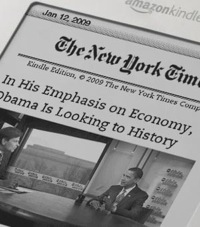 To me, the most interesting element of Jeff Bezos’ Kindle announcement today was that Kindle content will be arriving on other devices soon. (Bezos only hinted at it by referring obliquely to “other devices” during his presentation, but Gizmodo confirmed it.) One presumes you’ll soon be able to download a Kindle app for your iPhone or Android phone, with Blackberries and other smartphones not far behind.
To me, the most interesting element of Jeff Bezos’ Kindle announcement today was that Kindle content will be arriving on other devices soon. (Bezos only hinted at it by referring obliquely to “other devices” during his presentation, but Gizmodo confirmed it.) One presumes you’ll soon be able to download a Kindle app for your iPhone or Android phone, with Blackberries and other smartphones not far behind.
That decision could end up being more important to the company’s fortunes than the new device announced today — which, while a nice upgrade, doesn’t seem to radically change the calculus of whether or not to buy a Kindle. And it could have big implications for news organizations looking to the Kindle as a potential savior.
Business schools have long taught the razor-and-blades business model, in which a high-value good (like a razor) is given away or sold cheaply — with the idea that creating a world with a lot of razors will create big demand for the sale of razor blades. Give away the razor; make millions on the blades.
Apple has made a gazillion dollars by doing the opposite. They sell lots of songs through the iTunes Music Store and make not that much on each. Most of each song’s 99-cent price tag goes to the record label or to overhead. But if people are buying music on iTunes, they’re much more likely to buy a portable device to play those songs on — an iPod, a device where Apple makes a mint on each sale. Give away the blades; make millions on the razor.
Either way, the company is really in two related but discrete businesses: a device and a distribution channel through which to sell other devices.
It’s unclear how, exactly, Amazon is making money on the Kindle. It charges big money for the device, but e-paper tech is expensive enough that it may not be making much, if anything, on the device. (If you’ve seen reliable estimates of the manufacturing cost of a Kindle, speak up in the comments.) And the publisher/Amazon share of ebook revenues aren’t, to my knowledge, public either.
But putting Kindle readers on cell phones would seem to, in one swoop:
— massively increase the potential audience for Kindle ebooks, and
— massively decrease the demand for the Kindle device itself.
If I can buy and read Kindle ebooks on my iPhone, the chances of me paying $300+ for another gadget to carry around just dropped substantially. (Especially if there’s an iPhone-like device with a larger form factor in the works.)
For Amazon, that might be a perfectly reasonable trade-off. Owning the de facto standard for ebook distribution is a very valuable thing, as is having a huge potential customer base.
But I wonder if it does much good for news organizations.
After all, the newspaper hope for the Kindle is that people will be willing to pay $10 a month (or so) to subscribe to their news on the device. It’s the device that’s the key part of the equation; people are already used to paying $0 for news on their PCs or their cell phones. The value proposition for the Kindle is that this is a unique product tied to the device, and thus worth paying.
But if Amazon is willing to give up some market for the Kindle device in exchange for a larger Kindle distribution channel, then where does that leave news organizations? After all, if you want to read The New York Times on your iPhone, you can already go to www.nytimes.com or use the free NYTimes app. You don’t need to pay $10 a month for that. News, unlike ebooks, already has a working distribution channel: the Internet. A Kindle app on a cell phone would do wonders for ebook sales, but it could eliminate a lot of the appeal of news products sold through the service.
Obviously, it’s too early in the game to know what kind of implications this decision could have — we haven’t even seen the first app. But I suspect this decision will go down as an unhelpful one for news organizations.